Related Research Articles

The history of Sri Lanka is unique because the relevance and richness of it extends beyond the areas of South Asia, Southeast Asia and the Indian Ocean. The early human remains which were found on the island of Sri Lanka date back to about 38,000 years ago.

Ravana is a multi-headed rakshasa king of the island of Lanka, and the chief antagonist in the Hindu epic Ramayana. In the Ramayana, Ravana is described as the eldest son of sage Vishrava and Kaikesi. He abducted Prince Rama's wife, Sita, and took her to his kingdom of Lanka, where he held her in the Ashoka Vatika. Rama, with the support of vanara King Sugriva and his army of vanaras, launched an invasion against Ravana in Lanka. Ravana was subsequently slain, and Rama rescued his beloved wife Sita.
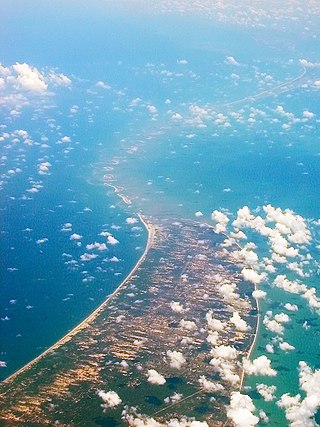

Mahinda Rajapaksa is a Sri Lankan politician. He served as the President of Sri Lanka from 2005 to 2015; the Prime Minister of Sri Lanka from 2004 to 2005, 2018, and 2019 to 2022; the Leader of the Opposition from 2002 to 2004 and 2018 to 2019, and the Minister of Finance from 2005 to 2015 and 2019 to 2021. He has been a Member of Parliament (MP) for Kurunegala since 2015.

Mahāvaṃsa (Sinhala: මහාවංශ, Pali: මහාවංස is the meticulously kept historical chronicle of Sri Lanka until the period of Mahasena of Anuradhapura. It was written in the style of an epic poem written in the Pali language. It relates the history of Sri Lanka from its legendary beginnings up to the reign of Mahasena of Anuradhapura covering the period between the arrival of Prince Vijaya from India in 543 BCE to his reign and later updated by different writers. It was first composed by a Buddhist monk at the Mahavihara temple in Anuradhapura in the 5th or 6th century CE.

Theravada Buddhism is the largest and official religion of Sri Lanka, practiced by 70.2% of the population as of 2012. Practitioners of Sri Lankan Buddhism can be found amongst the majority Sinhalese population as well as among the minority ethnic groups. Sri Lankan Buddhists share many similarities with Southeast Asian Buddhists, specifically Myanmar Buddhists and Thai Buddhists due to traditional and cultural exchange. Sri Lanka is one of five nations with a Theravada Buddhist majority.

Janatha Vimukthi Peramuna is a Marxist–Leninist communist party in Sri Lanka. The movement was involved in two armed uprisings against the government of Sri Lanka: once in 1971 (SLFP), and another in 1987–89 (UNP). The motive for both uprisings was to establish a socialist state.
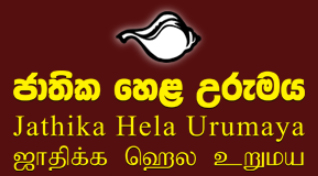
The Jathika Hela Urumaya is a nationalist political party in Sri Lanka. The JHU was launched in February 2004 by the lay-based, Sinhala nationalist political party Sihala Urumaya. Founding members include Kolonnawe Sumangala Thero, Uduwe Dhammaloka Thero, Ellawala Medhananda Thero, Omalpe Sobhitha Thero, Athuraliye Rathana Thero and Thilak Karunaratne. Some Sri Lankan Buddhists, including the All Island Clergy Organization, denounced the decision by monks to enter politics. The party drew support mainly from the middle class conservatives and the Buddhist youth.

Vibhishana is the younger brother of Ravana, the King of Lanka, in the ancient Indian epic Ramayana. Though a rakshasa himself, Vibhishana turned his back on Ravana, and defected to Rama's side, owing to his dharma. After Rama defeated Ravana, the former crowned Prince Vibhishana as the King of Lanka before returning to Ayodhya.

Hinduism is one of Sri Lanka's oldest religions, with temples dating back over 2,000 years. As of 2011, Hindus made up 12.6% of the Sri Lankan population. They are almost exclusively Tamils, except for small immigrant communities from India and Pakistan.
Sri Lanka is a country in the northern Indian Ocean which has been known under various names over time.
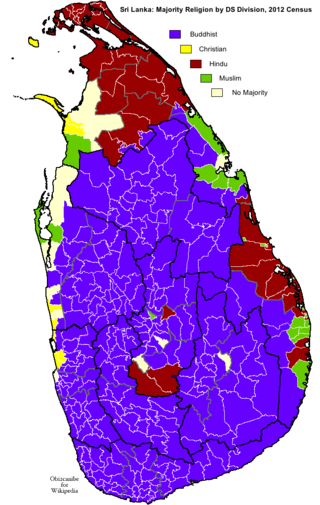
Sri Lanka is officially a Buddhist country, while Sri Lankans practice a variety of religions. As of the 2012 census, 70.2% of Sri Lankans were Buddhists, 12.6% were Hindus, 9.7% were Muslims, 7.4% were Christians. Buddhism is declared as the State religion of Sri Lanka and has been given special privileges in the Sri Lankan constitution such as the government is bound for protection and fostering of Buddhist Dharma throughout the nation. However, the constitution also provides for freedom of religion and right to equality among all its citizens. In 2008 Sri Lanka was the third most religious country in the world according to a Gallup poll, with 99% of Sri Lankans saying religion is an important part of their daily life.

Nandasena Gotabaya Rajapaksa, is a former Sri Lankan politician and military officer, who served as the eighth President of Sri Lanka from 18 November 2019 until his resignation on 14 July 2022 due to months of public anger. He previously served as Secretary to the Ministry of Defence and Urban Development from 2005 to 2015 under the administration of his elder brother former President Mahinda Rajapaksa, during the final phase of the Sri Lankan Civil War.
Sinhalese Buddhist nationalism is a Sri Lankan political ideology which combines a focus upon Sinhalese culture and ethnicity (nationalism) with an emphasis upon Theravada Buddhism, which is the majority belief system of most of the Sinhalese in Sri Lanka. It mostly revived in reaction to the colonisation of Sri Lanka by the British Empire and became increasingly assertive in the years following the independence of the country.
Between 2008 and 2009, major protests against the Sri Lankan Civil War took place in several countries around the world, urging national and world leaders and organisations to take action on bringing a unanimous cease fire to the Sri Lankan Civil War, which had taken place for twenty-six years. Tamil diaspora populations around the world expressed concerns regarding the conduct of the civil war in the island nation of Sri Lanka. The civil war, which took place between the Sri Lankan Army and the separatist group Liberation Tigers of Tamil Eelam is believed to have killed over 100,000 civilians. Protesters and critics of the Sri Lankan government that triggered a culturally based civil war to be a systematic genocide and ethnic cleansing of the Sri Lankan Tamil minority in Sri Lanka.
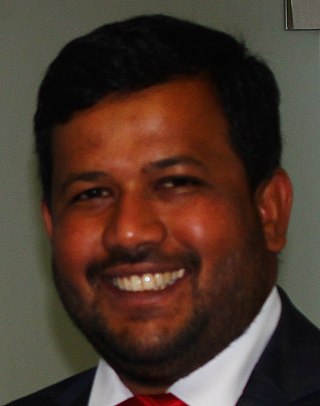
Rishad Bathiudeen is a Sri Lankan parliamentarian and former senior cabinet minister. He is the leader of the All Ceylon Makkal Congress (ACMC) Party, a registered political party in Sri Lanka. Bathiudeen was elected as a Member of Parliament (MP) from the Vanni Electoral District in December 2001 and was re-elected in April 2004, after which he was again re-elected in April 2010 and 2015 June from the same Electoral District which comprises Vavuniya, Mannar and Mullathivu Administrative Districts. Rishad Bathiudeen holds a National Diploma in Technology (NDT) in Civil Engineering from the University of Moratuwa, Sri Lanka and is also a member of the Chartered Institute of Engineering (C.I.E.) in the UK.
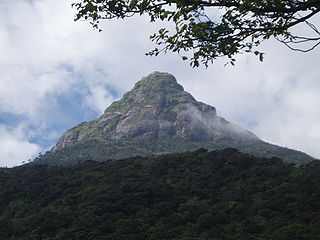
Adam's Peak is a 2,243 m (7,359 ft) tall conical sacred mountain located in central Sri Lanka. It is well known for the Sri Pada, a 1.8 m rock formation near the summit whose name is also used for the mountain itself. In Buddhist tradition the print is held to be the footprint of the Buddha, in Hindu tradition that of Hanuman or Shiva and in some Islamic and Christian traditions that of Adam or St. Thomas.

The Anuradhapura period was a period in the history of Sri Lanka of the Anuradhapura Kingdom from 377 BCE to 1017 CE. The period begins when Pandukabhaya, King of Upatissa Nuwara moved the administration to Anuradhapura, becoming the kingdom's first monarch. Anuradhapura is heralded as an ancient cosmopolitan citadel with diverse populations.

Bodu Bala Sena, also abbreviated as BBS is a far-right anti-liberalist, and ultranationalist Sinhalese Buddhist organization, and a break-away faction from the right-wing nationalist Jathika Hela Urumaya party. The BBS generally opposes pluralist and democratic ideologies, and criticizes non-extremist Buddhist monks for not taking action against the rise of other religions within Sri Lanka.
Buddhist scripture condemns violence in every form. Ahimsa, a term meaning 'not to injure', is a primary virtue in Buddhism. However, Buddhists have historically used scriptures to justify violence or form exceptions to commit violence for various reasons. As found in other religious traditions, Buddhism has an extensive history of violence dating back to its inception. This article discusses Buddhist principles with regard to violence, and also provides certain, historical instances concerning the use of violence by Buddhists, including acts of aggression committed by Buddhists with political and socio-cultural motivations, as well as self-inflicted violence by ascetics or for religious purposes. Despite these historical instances, as far as the Buddha's teachings and scriptures are concerned, Buddhism discourages violence for resolving conflicts. Contemporary violence, or the promotion of violence, has been on the rise in some Buddhist communities, most notably the persecution of the Rohingya by the Myanmar government.
References
- ↑ "Video: Ravana Balaya at Buddha Sasana Ministry - Caption Story | Daily Mirror".
- ↑ Ravana Balaya insists would rebel against Government if demands not met. lankanewsweb.net.
- ↑ Sri Lanka to research Ravana's aviation routes
- ↑ "Hey Ram! Politicians Cook up Ravana Cult in Sri Lanka". 12 August 2020.
- 1 2 "Jehova's Witnesses Christians "Arrested" and Threatened by Ravana Balaya Activists in Colombo Suburb". 18 June 2013.
- ↑ Extremist Buddhist Monk Visits Tamil Temple Threatened by Sinhalisation. 2020. Tamil Guardian.